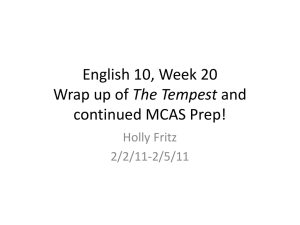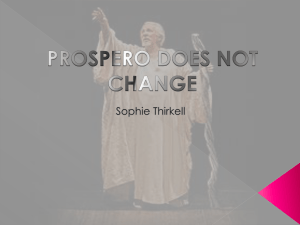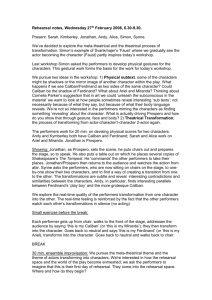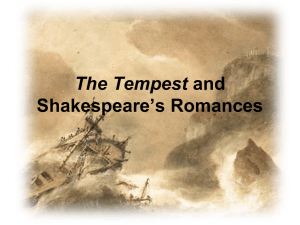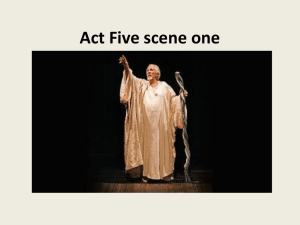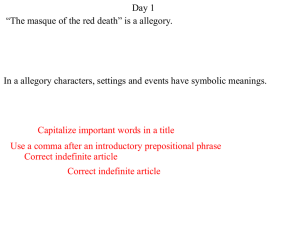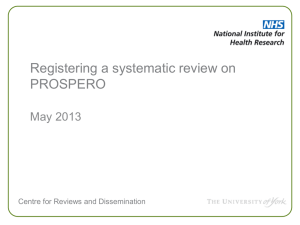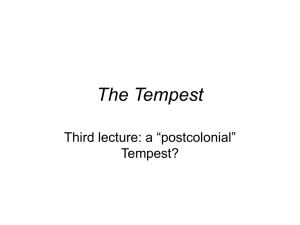The Tempest Characters - Stijn Eikelboom webdevelopment
advertisement
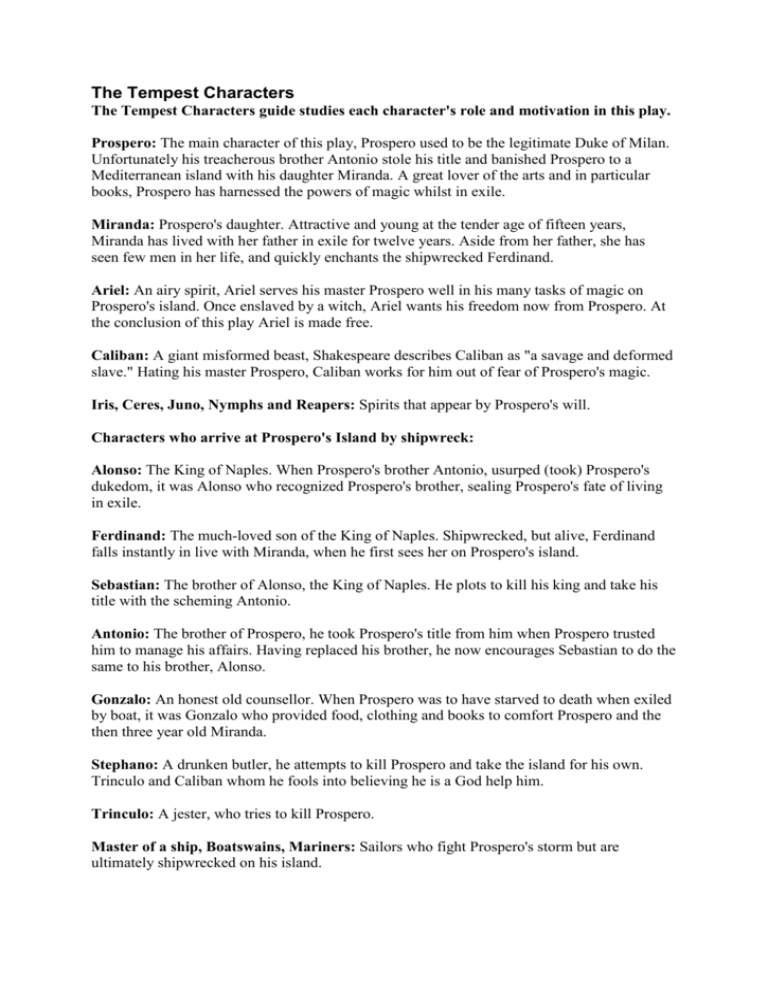
The Tempest Characters The Tempest Characters guide studies each character's role and motivation in this play. Prospero: The main character of this play, Prospero used to be the legitimate Duke of Milan. Unfortunately his treacherous brother Antonio stole his title and banished Prospero to a Mediterranean island with his daughter Miranda. A great lover of the arts and in particular books, Prospero has harnessed the powers of magic whilst in exile. Miranda: Prospero's daughter. Attractive and young at the tender age of fifteen years, Miranda has lived with her father in exile for twelve years. Aside from her father, she has seen few men in her life, and quickly enchants the shipwrecked Ferdinand. Ariel: An airy spirit, Ariel serves his master Prospero well in his many tasks of magic on Prospero's island. Once enslaved by a witch, Ariel wants his freedom now from Prospero. At the conclusion of this play Ariel is made free. Caliban: A giant misformed beast, Shakespeare describes Caliban as "a savage and deformed slave." Hating his master Prospero, Caliban works for him out of fear of Prospero's magic. Iris, Ceres, Juno, Nymphs and Reapers: Spirits that appear by Prospero's will. Characters who arrive at Prospero's Island by shipwreck: Alonso: The King of Naples. When Prospero's brother Antonio, usurped (took) Prospero's dukedom, it was Alonso who recognized Prospero's brother, sealing Prospero's fate of living in exile. Ferdinand: The much-loved son of the King of Naples. Shipwrecked, but alive, Ferdinand falls instantly in live with Miranda, when he first sees her on Prospero's island. Sebastian: The brother of Alonso, the King of Naples. He plots to kill his king and take his title with the scheming Antonio. Antonio: The brother of Prospero, he took Prospero's title from him when Prospero trusted him to manage his affairs. Having replaced his brother, he now encourages Sebastian to do the same to his brother, Alonso. Gonzalo: An honest old counsellor. When Prospero was to have starved to death when exiled by boat, it was Gonzalo who provided food, clothing and books to comfort Prospero and the then three year old Miranda. Stephano: A drunken butler, he attempts to kill Prospero and take the island for his own. Trinculo and Caliban whom he fools into believing he is a God help him. Trinculo: A jester, who tries to kill Prospero. Master of a ship, Boatswains, Mariners: Sailors who fight Prospero's storm but are ultimately shipwrecked on his island. The Tempest Summary Act I. A huge storm batters a ship carrying Alonso, (the King of Naples), Sebastian, (Alonso's brother), Ferdinand (Alonso's son), Antonio, Gonzalo and others. They are likely to die by shipwreck... On the island near the storm, Prospero and his daughter Miranda are introduced. We learn that Prospero has created the storm battling Alonso and company's ship. Miranda asks Prospero to stop the storm. We also learn that Prospero was once the Duke of Milan but was banished to this island with Miranda by Antonio, his brother who took over Prospero's dukedom of Milan. We are introduced to Ariel, Prospero's magic fairy who tells us that the men onboard the ship have all made it ashore unharmed as planned. Caliban, a misformed beast is also introduced. Ariel leads Ferdinand to Miranda and the two immediately fall in love. Prospero decides to be rude to Ferdinand, fearful of too rapid a courtship. Act II. The rest of the shipwreck survivors wake up on the island. They are surprised that their clothes smell and feel as fresh as if they had just been bought at a market... Ariel's song puts them all to sleep again except for Sebastian and Antonio. Antonio who replaced his brother Prospero as Duke of Milan manipulates Sebastian, King Alonso's brother into doing the same thing by replacing King Alonso. The two are about to kill Alonso in his sleep but Ariel awakens everyone and the two men quickly make an excuse for drawing their swords out. Trinculo, a jester on the ship, discovers Caliban and quickly realizes that such a beast would earn a fortune for him as a novelty in England. Stephano, Trinculo's friend eventually finds Trinculo under Caliban's huge frame. Stephano gives Caliban alcohol, causing Caliban to think Stephano is more powerful than Prospero whom Caliban hates. The three men set off together later deciding to kill Prospero... Act III. Prospero who is now invisible to Ferdinand and Miranda, witnesses Ferdinand and Miranda expressing their deep love for one another in words that rival Romeo and Juliet in their tenderness. Ferdinand, realizing he is witnessing a truly rare meeting of hearts, approves of Ferdinand for his daughter. The scene ends with Ferdinand taking Miranda for his wife. Prospero is pleased but must now leave to attend to matters before supper... Bottle in hand, Stephano, Trinculo and Caliban continue on their merry way together. Stephano starts getting delusions of grandeur, which Caliban blindly follows. Trinculo thinks Caliban is being foolish to follow Stephano so blindly. Caliban succeeds in convincing Stephano into killing Prospero and taking over the island and suggests several gruesome ways of killing Prospero. Ariel lures the group away with his entrancing sounds... Alonso, Sebastian, Antonio, Gonzalo, Adrian and Francisco and others witness a banquet on the island but it is an illusion. Ariel returns and verbally punishes Alonso (King of Naples), Antonio and Sebastian for their roles in exiling Prospero, Ariel's master... Act IV. Prospero tells Ferdinand that he no longer will punish him, but instead will freely give his daughter's hand in marriage to him. Prospero conjures up a beautiful, mythical, illusory party to celebrate, complete with goddesses and nymphs. Prospero instructs Ariel to lead the shipwrecked men on the island before him. Remembering Stephano, Caliban and Trinculo, Prospero has Ariel distract them with clothes, Caliban failing to keep his friends focused on killing Prospero. Prospero promises Ariel that he will soon be free... Act V. Prospero brings everyone except Stephano, Caliban and Trinculo before him in a circle. Spellbound, he verbally reprimands several of the men who exiled him. Prospero tells Ariel that he will soon be free and that he will miss him. Prospero also intends to destroy his ability to use magic. Making his presence known, Prospero forgives King Alonso, and tells Sebastian and Antonio he will keep secret their plan to kill Alonso, forgiving both. The famously sweet scene of Ferdinand playing chess with Miranda occurs. King Alonso is overjoyed to see his son Ferdinand and soon learns of Ferdinand's imminent marriage to Miranda. Prospero forgives Stephano and Trinculo. Caliban is embarrassed that he followed a fool (Trinculo). Caliban is given his freedom. Prospero announces that in the morning they will all set sail for Naples. Ariel is at last set free. Epilogue: Prospero asks the audience to free him to travel back to Naples reclaiming his life as Duke of Milan. The Tempest Themes Loss and Restoration PROSPERO’S attempt to recover his lost dukedom of Milan drives the plot of theTempest. But Prospero isn’t the only character in the play to experience loss.ARIEL lost his freedom to Sycorax and now serves Prospero. CALIBAN, who considers himself the rightful ruler of the island, was overthrown and enslaved by Prospero. By creating the tempest that shipwrecks ALONSO and his courtiers on the island, Prospero strips them of their position and power, and also causes Alonso to believe that he has lost his son to the sea. Through their reactions to these losses, the play’s characters reveal their true natures. Reduced to desperation and despair, Alonso recognizes his error in helping to overthrow Prospero and gives up his claim to Milan, returning Prospero to power and restoring order between Milan and Naples. Though he desperately wants to be free, Ariel loyally serves his master Prospero. Prospero, meanwhile, gives up his magic rather than seeking revenge and frees Ariel before returning to Milan. In contrast to Alonso,ANTONIO and SEBASTIAN never show remorse for overthrowing Prospero and prove to be ambitious killers in their plot to murder and overthrow Alonso.STEPHANO and TRINCULO, in their buffoonish way, likewise seek power through violence. And Caliban, as opposed to Ariel, hates Prospero, and gives himself as a slave to Stephano in an effort to betray and kill Prospero. As GONZALOobserves in the last scene of the play, the characters “found ... ourselves, when no man was his own” (5.1.206-213). Power From the opening scene of The Tempest during the storm, when the ruling courtiers on the ship must take orders from their subjects, the sailors and the boatswain, The Tempest examines a variety of questions about power: Who has it and when? Who’s entitled to it? What does the responsible exercise of power look like? How should power be transferred? The play is full of examples of power taken by force, and in each case these actions lead to political instability and further attempts to gain power through violence.ANTONIO and Alonso’s overthrow of PROSPERO leads to Antonio and Sebastian’s plot to overthrow Alonso, just as Prospero’s overthrow and enslavement ofCALIBAN leads Caliban to seek revenge. Ultimately, it is only when Prospero breaks the cycle of violence by refusing to take revenge on Alonso, Antonio, Sebastian, or Caliban that the political tensions in the play are calmed and reconciled. After Prospero’s merciful refusal to seek revenge, Alonso and Prospero quickly come to an understanding and unite their once warring cities through the marriage of their children. The Tempest suggests that compromise and compassion are more effective political tools than violence, imprisonment, or even magic. Magic, Illusion, and Prospero as Playwright The Tempest is full of Prospero’s magic and illusions. The play begins with Prospero’s magic (the tempest), and ends with Prospero’s magic (his command that Ariel send the ship safely back to Italy). In between, the audience watches as Prospero uses visual and aural illusions to manipulate his enemies and expose their true selves. At nearly every point in the play, Prospero’s magic gives him total control—he always seems to know what will happen next, or even to control what will happen next. At one point, Prospero even goes so far as to suggest that all of life is actually an illusion that vanishes with death: “We are such stuff as dreams are made on, and our little life is rounded with a sleep” (4.1.156-158). Many critics see Prospero’s magical powers as a metaphor for a playwright’s literary techniques. Just as Prospero uses magic to create illusions, control situations, and resolve conflicts, the playwright does the same using words. Throughout the play, Prospero often lurks in the shadows behind a scene, like a director monitoring the action as it unfolds. Prospero refers to his magic as “art.” In Act 4 scene 1, Prospero literally steps into the role of playwright when he puts on a masque for MIRANDA and FERDINAND. In fact, many critics take an additional step, and argue that Prospero should actually be seen as a stand-in for Shakespeare himself. The Tempest was one of the last plays Shakespeare wrote before he retired from the theatre, and many critics interpret the play’s epilogue, in which Prospero asks the audience for applause that will set him free, as Shakespeare’s farewell to theatre. Colonization During the time when The Tempest was written and first performed, both Shakespeare and his audiences would have been very interested in the efforts of English and other European settlers to colonize distant lands around the globe. The Tempest explores the complex and problematic relationship between the European colonizer and the native colonized peoples through the relationship between Prospero and Caliban. Prospero views Caliban as a lesser being than himself. As such, Prospero believes that Caliban should be grateful to him for educating Caliban and lifting him out of “savagery.” It simply does not occur to Prospero that he has stolen rulership of the island from Caliban, because Prospero can’t imagine Caliban as being fit to rule anything. In contrast, Caliban soon realizes that Prospero views him as a second-class citizen fit only to serve and that by giving up his rulership of the island in return for his education, he has allowed himself to be robbed. As a result, Caliban turns bitter and violent, which only reinforces Prospero’s view of him as a “savage.” Shakespeare uses Prospero and Caliban’s relationship to show how the misunderstandings between the colonizer and the colonized lead to hatred and conflict, with each side thinking that the other is at fault. In addition to the relationship between the colonizer and colonized, The Tempest also explores the fears and opportunities that colonization creates. Exposure to new and different peoples leads to racism and intolerance, as seen when SEBASTIAN criticizes ALONSO for allowing his daughter to marry an African. Exploration and colonization led directly to slavery and the conquering of native peoples. For instance, Stephano and Trinculo both consider capturing Caliban to sell as a curiosity back at home, while Stephano eventually begins to see himself as a potential king of the island. At the same time, the expanded territories established by colonization created new places in which to experiment with alternative societies. Shakespeare conveys this idea in GONZALO’S musings about the perfect civilization he would establish if he could acquire a territory of his own.


